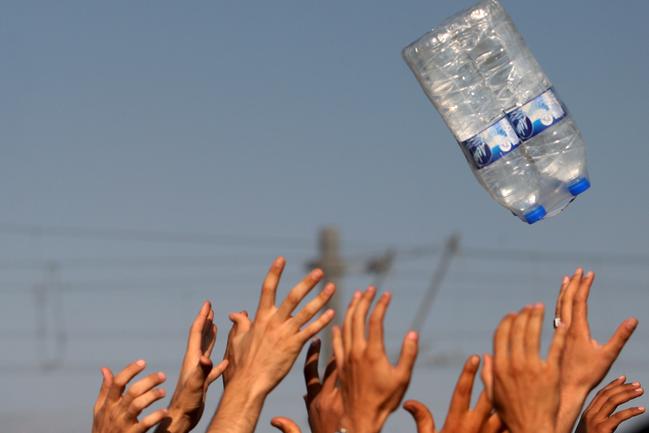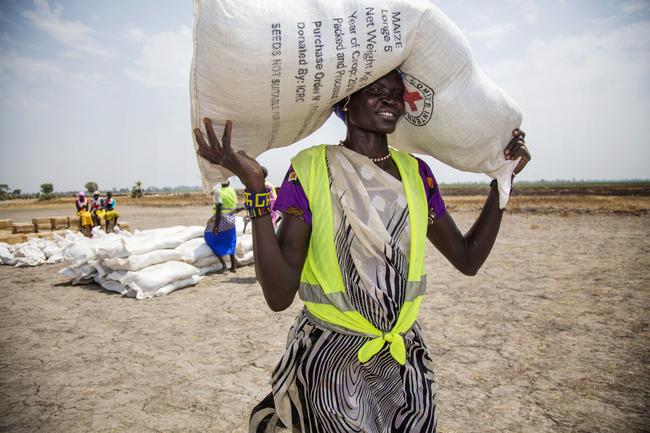Organisations GiveWell, Baptist World Aid are helping Generation Z to hack philanthropy
Globalisation has made it easier than ever to engage in philanthropy, and give to someone on the other side of the world.

In many ways, charity is uncomplicated. That you give, to the best of your ability, in order to help society’s most vulnerable is a simple rule to live by. And then there is the admirable work of our longstanding institutions like Red Cross, Salvation Army, Cancer Council, and Jeans for Genes, all charities that have made the process of donating to someone on the other side of the country (and the world) easier than ever. As much as we might bemoan technology’s more pejorative influences, it’s undeniable that globalisation has bestowed charities with an unprecedented accessibility. No need for lengthy forms of paperwork — just a quick signature, note, or an easy coin, so you can offer aid in the space of a second.
But now, the next generation is forging their own path. Not a way forward that’s diverged from the legacy charities have already established, but whose direction is being determined by more than just the straightforward act of giving. Instead, the world’s youngest philanthropists have begun looking not only to donation, but to distribution, using the wealth of data at their fingertips to interrogate the impact of charitable establishments themselves. Theirs is a quest to answer a singular question:
How do you make sure your money is actually making a difference?
Aravindh Anura is one such Generation Z-er in search of that truth. He doesn’t mean to sound cynical about charities — in fact, he’s probably one of the least cynical young people I’ve ever met. But the question of impact, and what exactly happens to our money when we give it away, is a question that he and the group he belongs to has been attempting to answer for years.
You see, Anura is a follower of an emergent modern philosophy called ‘effective altruism’. He was the former president of its namesake group at the University of Melbourne, where he studies. Effective altruists like Anura dedicate themselves to understanding how we, as individuals and as a collective, can help as many people as we possibly can.
“It made a lot of sense,” he said, “to live my life with pure intention. To look at impact in an impartial way, and do good not tokenistically, but authentically.”

What is effective altruism?
Unlike other philosophies, effective altruism isn’t just derived from an abstract conception of good — it’s rooted firmly in the actionable. When others focus simply (and it must be said, just as necessarily) on the act of giving, effective altruism looks also at its consequences. How, it asks, can we make sure that our donations are imparting as much benefit as possible?
In short, effective altruists believe we should be donating at least 10 per cent of our income every year — but only to charities with the greatest calculable impact. (On Effective Altruism’s official Australian website, you can literally calculate the impact of your donation by simply entering a number, and choosing a charity.)
Independent charity evaluator, GiveWell, is one such effective altruist partner, dedicated to researching and listing the most high-impact, cost-effective charities in the world. Against Malaria Foundation and Helen Keller International are two organisations that top GiveWell’s list as ones that maintain consistently impressive donation-to-impact ratios. GiveWell’s donors can also choose to forward their money to their maximum impact fund, which distributes the donations among the organisation’s recommended charities based on need. Animal advocacy projects, like The Good Food Institute and the Alternative Protein Initiative, also form a significant role in their overarching ambition to transition into a more sustainable, cruelty-free world.

Where does effective altruism go wrong?
It would, however, be misleading to present effective altruism as a flawless worldview. Groundbreaking as it is to comprehend the impact of charity through the lens of reason, numbers, and beautiful, tangible evidence, it’s an understanding of good that has attracted criticism for being depersonalising, and potentially ignorant of intrinsic value. Is knowledge important if it doesn’t create welfare? Isn’t this too thin, or arid a conception of morality? One of GiveWell’s more provocative articles, for example, is titled, “The Wrong Donation Can Accomplish Nothing.”
“Conventionally, most people expect that charities are probably accomplishing good unless there‘s proof that money is being misappropriated,” GiveWell states. “We disagree. We think that charities can easily fail to have impact, even when they’re doing exactly what they say they are.”
Over the years, particular demands have been heavily criticised, most notably the popular belief that everyone should choose or switch into a career that amplifies their “positive impact” — or as some have interpreted it, the job that makes the most money. As unintended as it may have been or may be, it’s confronting to think about a philosophy that, at its core, encourages the rich to get richer. Not only that, but with a predominantly male upper class, effective altruism risks inadvertently locking out women — and therefore half of the living population who might otherwise support it.

Room for ideological change
Of course, I’m hardly a philosophical expert. The last thing I want to do is be reductive about a well-meaning point of view, so I ask Anura what he thinks about the criticisms that have been levelled at effective altruism. To his remarkable credit, the first thing Anura does is acknowledge that effective altruism is not, and may never be, a perfect philosophy. Anura’s group itself has placed admirable emphasis on their flaws, always recognising the importance of diversification, and pledging to implement equal employment opportunities for their staff and attract a balanced membership through other initiatives.
Rather unfortunately, the early days of effective altruism were also marred by a heavily marketed ‘earn to give’ campaign, a mentality which the group has since retracted and discouraged — but has managed to linger in the public consciousness. Since then, effective altruism partners like GiveWell have started to involve themselves in philanthropy that, while less measurable, are equally as crucial. (Think prison reform, and other societal benefits that don’t have quantitative value.) With projects like Open Philanthropy, the Oxford University-run Future Humanity Institute and Charity Entrepreneurship, effective altruists turn to practicality and rationality as the next, best thing from data-optimised solutions.
Contemporary conceptions of the philosophy, Anura says, do not fundamentally discount the intangible good. If anything, the philosophy as a whole has begun to move away from the idea of charity, or funnelling money into different places, to an idealistic vision of community.
“Starting your own lobby group, doing something niche that you’re really good at — effective altruism is about rigorously prioritising what is important through huge amounts of research,” Anura says. “It’s not just charity. It’s a whole, engaged idea of career, of community, of academia, and of proven calculations arising from that web.”
“Which organisation has significant room for funding and for my donations? Which animals are most subject to solvable ailments?”

Is it possible to be calculating, but not cold, with your charity?
Anura also takes care to differentiate between effective altruism and other philosophies like utilitarianism. Referring to a recent paper on effective altruism by Will McGaskill, Anura says that the definition of the philosophy, as it now stands, is incredibly broad. “It incorporates most ethical beliefs. There’s effective altruism for Buddhists, there’s effective altruism for Christians. That we see it enmeshed in so many disparate worldviews is a testament to its impartiality, and its single, universal drive to do good.”
And Anura is right — though some organisations conduct their charity work under the umbrella of their religious values, at the end of the day, they share much in common with what effective altruism celebrates. At Christian organisations like Baptist World Aid, for example, volunteers and local churches commit themselves to eradicating poverty, partnering with agencies overseas in order to support families with inadequate access to education or healthcare, as well as providing shelter and food to refugees or the displaced. Currently, over 16,000 Australians have immersed themselves in charity work with the foundation, doing what they can in countries across the Pacific. Their goal is impactul and simple: to love, and to give.
But a part of my philosophically untrained brain still can’t shake the conception that official effective altruist partners — not organisations such as Baptist World Aid that just happen to align with its teachings — follow a utilitarian philosophy. It’s this primary uncertainty, which I’ve been left with since discovering effective altruism with Anura — how is it possible to be calculating with your money, but not cold? How is it possible to give, guided wholly by science and reason, but not lose sight of the virtue of charity?
Anura pauses a while before responding. “The very nature of modern action is to create far-reaching consequences, that one hundred years ago, we could not have rationally begun to comprehend,” he says. “In the world we live in now, we could — with a couple of dollars — radically transform the life of someone very, very far away. Both temporally and spatially, the field has expanded to include people, animals, the environment.”
“In some ways, because of the sheer vastness of the modern world, we have to have a more rational, distributive method.”
But, as Anura iterates, living with an effective altruist mindset doesn’t mean casting away our own interpersonal debts — of love, of kindness, or generosity. These form the very foundation of what the philosophy is ultimately striving to further. Ultimately, all effective altruism is to Anura, and to those who use it to guide their decision-making, is a branch of morality, representing our innate obligation to help each other, as humans, and pave a better future.

Doing good, better
I come away from listening to Anura feeling as though I’ve gained a whole new perspective on my place in the world, and what I — a tiny seemingly insignificant person — can do. Perhaps effective altruism is focused on incremental political change. Perhaps it’s not as radical as some prefer their philosophies.
But at the end of the day, it’s encouraging people — and most importantly, younger generations and those yet to come — to do conscious good. Not an idea of ‘good’ as some innate, abstract quality, but as a practice, a virtue that we nurture, with every choice we make. A submission, if you will, to a sort of epistemic humility.
We will never know what the best way to live our lives is. We will never know if the philosophy we follow is the right one, or if the right one can ever exist. But what we do know is that we all have the power to help someone who needs it. Another person, born by mere providence into different circumstances.
We know that we can spare change, and give with both our hearts, and heads.

